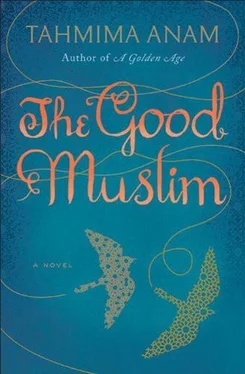Several months after Chottu and Saima’s party, Joy telephoned with another invitation. ‘The party wasn’t really your cup of tea, was it?’
‘Was it yours?’ She was glad to hear his voice. ‘Why haven’t you rung?’
He laughed. ‘I was waiting for the right opportunity and it has just come up.’
‘Oh? What’s that? Not another evening of whisky and dancing?’
‘Maya-bee, your heart is as hard as sugar. No, this is something totally different — I thought you might like to see the other side.’
‘The other side of what?’
‘People who care about the same things you do.’
‘No, thanks. I already did. You remember Aditi — I met her at the party? She took me to her newspaper office. The editor is giving me a column.’
‘Shafaat?’
‘You know him?’
‘Everyone knows him.’
She didn’t like the way he said everyone . She was about to tell him so when he said, ‘I’m talking about real revolutionaries. Look, you won’t regret it — I’ll pick you up at three.’ Before she could reply, he hung up. Real revolutionaries. He knew she wouldn’t be able to resist that, even if it was only a joke. Everyone knew there weren’t any real revolutionaries left, not in Dhaka, not in the world. It was 1984 after all.
They drove to Kolabagan. The woman who answered the door introduced herself as Mohona. ‘Come with me,’ she said, leading them down an unlit corridor that smelled of old books and damp. The corridor opened into a drawing room with large windows on one side. Money plants climbed up the grilles and fingered the ceiling. There were a handful of people there already, seated in a loose circle. It was a long time since Maya had been to a meeting, but the scene was familiar: the women in plain cotton saris, the sparse jute furniture, the smell of paper and incense. She drifted away from Joy and sat down beside a man in a uniform.
‘Hello, I’m Sheherezade,’ she said, using her formal name.
‘Lieutenant Sarkar,’ he replied, nodding. ‘You have been to the meeting before?’
‘No, my first time.’
‘Jahanara Imam is coming today.’
Maya’s eyes widened. ‘Really?’ Jahanara Imam had written a book about losing her son in the war. Everyone had read it; they called her Shaheed Janani, Mother of Martyrs . Joy was right about bringing her here. Maybe she could even write about it for the newspaper. She settled into her seat and pulled out her notebook. Soon the room filled up; when the chairs ran out, people leaned against the wall or crouched on the floor. ‘That’s her,’ the army man said, pointing to an elderly woman who had just taken her seat.
The meeting was called to order by Mohona. She welcomed everyone, including, with a nod to Maya, people who were joining them for the first time. Joy found a seat in the row behind her, tapped her on the shoulder. ‘What did I say?’
Jahanara Imam rose. Tiny, in a white cotton sari, she looked insubstantial, like a froth of smoke. Her voice, however, was firm, her words direct. ‘It has been thirteen years,’ she began, ‘but I know that, like me, you have not forgotten. It has been thirteen years and our war is not over. Perhaps we gained our freedom, perhaps you can hold your head high and say you have a country, your country. But what sort of country allows the men who betrayed it, the men who committed murder, to run free, to live as the neighbours of the women they have widowed, the young girls they have raped?’
She told the story of Ghulam Azam, whose thugs had collaborated with the Pakistan Army, led them to guerrilla hideouts, helped them burn villages. Not only was he acquitted of any wrongdoing, but he was being considered for Bangladeshi citizenship.
Maya had always prided herself on remembering exactly who she had been before the war broke out. She remembered her politics, the promises she had made to herself about the country. She remembered the sight of dead men with their hands tied behind their backs, their faces lapped with blood, and she remembered every day she had worked in the camps, scooping bullets out of men with nothing but a spoon and a hunter’s knife.
She remembered everything she had done and who she had been and who she had vowed to remain. But now, listening to this woman, she felt herself pulled and folded back into another body, one that hadn’t been lonely all these months and years, one that hadn’t left home and trodden carelessly around the past decade, one that could shore up the memories of that time and get angry when the moment came for anger.
She clapped along with the others, between Jahanara Imam’s sentences. The room was growing hot now, bright sunlight filtering through the thicket of money plants. Someone turned up the ceiling fan, and the women readjusted themselves as the folds of their saris flapped open. Maya held down the pages of her notebook.
When Jahanara Imam was finished, Mohona stood up again. ‘How many of you have lost a loved one to the war?’
Hands went up. Maya’s too.
‘Madam,’ said a man in a grey suit, ‘I lost my father and mother. They went to the university and shot the professors.’ From the back of the room, another voice added, ‘My relatives lived in Old Dhaka. They killed my uncle, my grandfather.’
More people spoke up, announcing the date of their loss, the circumstances. Caught in the crossfire. Shot by the army on a raid in their village. Tortured to death at the cantonment.
The confessions made Maya grip the underside of her seat. Would they each have to get up and confess who they had lost, exactly what they had done, in the war? She found herself shivering under the whirr of the fan. A woman was talking about documenting all the atrocities of the war. ‘We should make a list,’ she was saying, ‘and identify all the killers.’
Maya found herself raising her hand. Mohona pointed to her. ‘I think — I believe — that the first thing we must do is admit our own faults, our own sins. So much happened during the war — we were not just victims.’
The room suddenly grew quiet.
Lieutenant Sarkar turned to her and said gently, ‘You are speaking to a room full of wounded souls, my dear.’
She could hear people breathing quietly, waiting for the awkward moment to pass. Finally Mohona stood up. ‘We all have our private grief. But we are here to talk about the collabor ators. Let us focus on the task at hand. If we document the atrocities in a systematic manner, Ghulam Azam will surely be denied permission to stay in Bangladesh.’
The voices rose again, and Maya was left with a sharp pain under her ribs. She thought of her own casualties of war, the reason she had raised her hand. But there were also the things that she had done, which returned to her now, the memories clear and sharp. She turned to Joy. ‘I have to go,’ she whispered.
‘Wait — it’s almost finished. Another ten minutes.’
She couldn’t wait. She stood up, stepping over Lieutenant Sarkar’s knees. At the end of the row she overturned someone’s teacup, and the clattering made the room quiet again. ‘Excuse me,’ she mumbled, and fled. She emerged into the fading afternoon, a busy road with a succession of trucks lumbering by. In the distance was a jumble of tin shacks, and when she grew near she saw that it stretched far beyond the horizon, row after row of frail-looking structures, pasted together with bits of paper, cinema posters and calendars and newspaper and jute and cow dung. She found an overturned crate and sat down to face it.
‘I’m not getting it right.’ It was Joy. He crouched beside her.
‘You’re not my tour guide.’
‘But you’re back after so long, I don’t want you to get the wrong impression.’
Читать дальше












